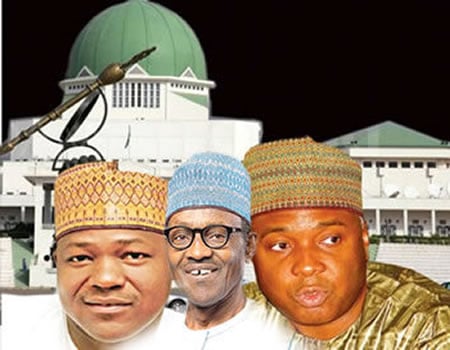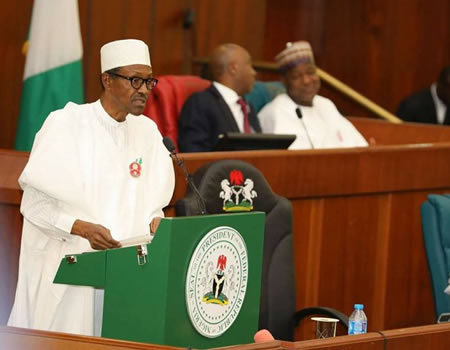The process leading to the presentation of 2019 budget by President Muhammadu Buhari on December 19, 2018 in the National Assembly was fraught with drama, tension and protests. But no one envisaged the turn out of the event at the joint session of the Senate and the House of Representatives on the D-Day.
Two weeks before the December 19 date, members of the Parliamentary Staff Association of Nigeria (PASAN) picketed the sprawling National Assembly complex and disrupted the sitting of the Senate and the House of Representatives. The workers were demanding the payment of the arrears of their allowances and salaries as well as promotions due, which they claimed were withheld by the Clerk to the National Assembly (CNA), Alhaji Ataba Sani-Omolori. However, the political leadership of the Assembly led by Senate President Bukola Saraki and Speaker of the House of Representatives, Honourable Yakubu Dogara sprang into action and were able to calm the workers after a day strike. There were assurances given by the CNA to the effect that the outstanding payments would be made in a short while and the workers reverted to status quo.
But as the budget presentation week drew to a close, the workers issued a statement indicative of their desire to embark on a four-day warning strike starting on December 17. They made good their intention that Monday and blocked all entrances leading into the Assembly. The workers also cut off electricity and water supply to the complex, thus making the entire Assembly inhabitable for Bankers, Restaurateurs and other ancillary businesses. Series of meetings between the management and political leadership of the Assembly on one hand and the leadership of PASAN failed to yield desired efforts by the workers and it was confirmed that the strike would continue on Tuesday. They continued the strike that day but the political wing of the Assembly was able to break the ranks of the workers, as the chambers were able to conduct business.
By Wednesday, December 19, relevant resolutions had been passed to enable the Senate and the House to hold a joint sitting to receive the 2019 budget. It was certain that the resistance of the workers had been broken and that the budget presentation would go on without hitches. But the foundation for another form of crisis had been laid two weeks earlier, this time at the front of the lawmakers. A news item credited to the Minister of Budget and National Planning, Senator Udoma Udo Udoma, had accused the National Assembly of delaying the presentation of the 2019 budget.
Feelers from the Assembly indicated at the time that the lawmakers were heavily jolted that they could be so accused by a minister who was a former ranking member of the National Assembly. It was gathered that the lawmakers were particularly angered that the accusation was coming at a time when the president had not communicated a time he would want to make the budget presentation. That scenario, coupled with the bottled-up anger as to President Buhari’s uncooperative stance with the National Assembly over the years, made it obvious that the discontent had taken a higher gear and that the ground may not be level when the president enters the hallowed chambers to deliver the 2019 budget.
So, it turned out that as Buhari entered a packed House of Representatives chambers on December 19, as he descended the stairs, some lawmakers moved to cheer him with shouts of Sai Baba! Sai Baba! But they were rudely interrupted by the louder solidarity songs oozing out of the decks around the chambers. Some lawmakers sang: By struggle! By struggle!! Freedom come!!! Repeatedly, the songs oozed out of the speakers and dwarfed the proceedings. Also drowned were the voices of some lawmakers and government officials who were cheering the president with clenched fist and shouts of Sai Baba!! It was a huge drama combining the sweet and sour.
The Senior Special Assistant to the President on National Assembly Matters (Senate), Senator Ita Enang, who led the president into the chambers attempted to raise the tempo of support as the president made his way into the chambers but the voices of dissent continued to punctuate every step of the president. It took the Senate President and the Speaker a hell of time to bring the Assembly to order.
Perhaps, reading the tensed mood of the chamber, Senate President Bukola Saraki did not read the traditional welcome address. He only ushered the president to the podium to present the 2019 budget.
From that point, hell was practically let loose as the lawmakers heckled the president every sentence of the way. Intermittently, the lawmakers tackled the president, punctuating every sentence with words like no! It’s not true! Lies! Campaign promises! Propaganda!
At a stage, a worried President Buhari admonished the lawmakers thus: “Honourable members, let us conduct ourselves properly. The world is watching us. We are supposed to be above this.”
That did not douse the tension though, as the lawmakers on the anti-Buhari and pro-Buhari factions continued the tug of war. As some lawmakers concentrated on tackling the president, some displayed placards with different inscriptions to express their displeasures over the budget presentation, others shouted at their voices to put a lie to the claims in the budget speech. It was gathered that many of the lawmakers were angry at the non-implementation of the 2018 budget, especially the capital component of the budget that affected their constituency projects.
Shortly after the budget speech, the Clerk to the National Assembly (CNA), Sani-Omolori, who was more than rattled on his seat close to the president, had to stand up from his seat to see what he could do to save the situation. Also at that stage, the Majority Leader of the House, Honourable Femi Gbajabiamila approached the Senate leadership with the Senate President and the Speaker.
As this was going on, the National Anthem came up, signalling the end of the ceremony, even though the Speaker who was to respond on behalf of the National Assembly had not present his speech amidst the commotion. He hit the gavel several times to call the chamber to order but the commotion was total. The Clerk to the National Assembly approached the president and advised him to turn round and exchange pleasantries with presiding officers before taking a bow to leave the chambers.
Even as he departed, the protesting lawmakers only intensified their songs, even as the president’s supporters also upped their shouts of Sai Baba.
Earlier during the proceedings, two members of the House of Representatives were prevented from exchanging blows as the rival camps in the Assembly drama attempted to outdo each other.
The N8.83 trillion 2019 Budget presented by President Buhari is according to the President premised on the assumption of crude oil benchmark of $60 per barrel; 2.3 million barrels per day oil production; inflation rate of 9.98 percent and exchange rate of N305 to one US Dollar.
According to the president, “notwithstanding the recent softening in international oil prices, the considered view of most reputable analysts is that the downward trend in oil prices in recent months is not necessarily reflective of the outlook for 2019.”
He said that the Federal Government has mandated the Nigerian National Petroleum Corporation (NNPC) to ensure that the oil production target of 2.3 million barrels per day was achieved, adding that the Government has also set aside the sum of $1 billion for NNPC’s cost recovery or fuel subsidy in the New Year.
The government is projecting that its revenue in 2019 would stand at N6.97 trillion (which is 3 percent lower than the 2018 estimate of N7.17 trillion), and which will comprise a projected oil revenue of N3.73 trillion, while non-oil revenues are projected to stand at while non-oil revenue is estimated at N1.39 trillion.
While admitting that the government was making allowance for fuel subsidy, Buhari said: “We have allowed for N305 billion ($1 billion) for under-recovery by NNPC on PMS in 2019. We will continue working to bring it downwards so that such resources are freed up to meet the developmental needs of our people.”
A breakdown of the proposed N8.83 trillion 2019 budget also shows that recurrent expenditure would stand atN4.04 trillion; Debt Service would gulp N2.14 trillion; Statutory Transfers to stand at about N492.36 billion; Sinking Fund to stand at N120 billion (to be used to retire maturing bond to local contractors, while Capital Expenditure is projected at N2.031 trillion.
A further breakdown of the recurrent expenditure as presented by the president indicates the top four ministries to include: MiniInterior, N569.07 billion;
Defence, N435.62 billion; Ministry of Education; N462.24 billion for the Ministry of Education; and the Ministry of Health with the sum of N315.62 billion.
On Debt Service, the president said that 80 per cent of the sum of N2.14 trillion would be used to service domestic debt, which he said accounts for about 70 per cent of the total debt.
He said that while the national debt is within sustainable limits, there is the need to increase domestic resource mobilization “to bring down our debt-revenue ratio over the medium term.”
The president also assured Nigerian workers that the new minimum wage would be included in the 2019 budget adding that he would soon send a bill to the National Assembly to that effect.
He said: “I am committed to addressing the issue of a new minimum wage and I will be sending a bill to the National Assembly on this. However, in order to avoid a fiscal crisis for the Federal Government, as well as the states, it is important to devise ways to ensure that its implementation does not lead to an increase in the level of borrowing.”
He also told the lawmakers that a high powered technical committee would be set up to advise on ways of funding the new minimum wage without additional borrowing and also to ensure that the wage increase does not trigger inflation.
The work of this technical committee he said “will be the basis of a Finance Bill which will be submitted to the National Assembly, alongside the Minimum Wage Bill.”
In addition, the technical committee according to him will recommend modalities for the implementation of the new minimum wage in such a manner as to minimise its inflationary impact, as well as ensure that its introduction does not lead to job losses.
Genesis of the crisis
The “ugly incident” that was witnessed on December 19 actually had a long history, as the government of President Buhari has maintained a cat and mouse relationship with the 8th National Assembly since inception on June 9, 2015.
Whereas the president’s caucus in the ruling All Progressives Congress (APC) did not support the emergence of Senator Saraki and Speaker Dogara as presiding officers of the Senate and the House of Representatives, the party also failed to manage the aftermath of the legislative elections. Notwithstanding the fact that the president had promised to work with those that emerged in the June 9 elections in the chambers of the Assembly, the party stood aloof, allowing the crisis in the chambers to boomerang as its loyalists moved to assert control over the leadership that emerged.
With that as the background to the executive/legislative engagement under the president, the situations that subsisted did not hold inter-relationship of powers in anyway. It is as if powers under the administration are compartmentalised as there existed little or no consultative hearings between the two arms of government.
The legislators often complained that their resolutions, which are originally advisory, are never taken into considerations and that the level of consultations between them and the executive was near zero. For instance, the Senate devoted two weeks to debate the economic and security situation of the country and passed 21 resolutions, which were passed to the president in 2017. None of those recommendations, however, were considered in the making of the 2018 budget.
In September, President Buhari wrote the National Assembly asking them to withdraw the constituency projects already inserted into budget 2018 and vire the funds allotted for the purpose of 2019 elections. It appeared a huge affront on the lawmakers who needed to campaign in their constituencies on the basis of projects attracted within their tenure. The lawmakers, however, simply side-stepped the request by approving the funds for the 2019 election from other sources.
That notwithstanding, the executive hardly funded the constituency projects, as it had been its tradition over the years.
Another issue, which insiders in the National Assembly noted contributed to the drama in the National Assembly during the budget presentation, was a rumour was being circulated among the lawmakers recently that the president had been heard by a delegation that visited him in the Villa, referring to “those characters in the National Assembly.”
It would not be long before the Ministries, Departments and Agencies (MDAs) caught the bug of the feuding executive and legislature. Perhaps, having sensed that the National Assembly was not really reckoned with by the administration, the MDAs also relegated the importance of the legislature and the effect is that, the respect and awe accorded to the National Assembly over the years diminished considerably.
The National Assembly shouted to the rooftops that the 2018 budget was being delayed because agencies failed to defend their budgets before the Senate and House Committees. It took an official communication from the Secretary to the Government of the Federation (SGF), Boss Mustapha, to get the MDAs into the National Assembly for budget defence.
It is instructive that the delays suffered by the national budgets have been on the upswing since the beginning of this administration. Besides the lukewarm attitude of the MDAs to budget defence, there is also the attitude of “budget dumping” adopted by the administration. Whereas the Fiscal Responsibility Act dictates that the budget would only be prepared after the passage of the Medium Term Expenditure Framework (MTEF) and the Fiscal Strategy Paper (FSP) by the National Assembly, the Buhari budgets were usually dropped in the Assembly when the consideration of MTEF/FSP was ongoing. The document containing MTEF/FSP, which form the bedrock of the 2019 budget, was submitted in November and is yet to be passed by the National Assembly as of December 19, when the budget was submitted.
Besides, the president appeared to show obvious lack of readiness to work with the lawmakers when he often rejects the bills passed by the chambers. “It appears that the job of the presidency was to ambush the lawmakers and announce rejection of their ideas aimed at restructuring the nation’s laws,” a senator who spoke on a condition of anonymity said.
For instance, the president rejected seven bills passed by the two chambers just before the last quarter of the year 2018, while he also rejected the Electoral Act Amendment Bill 2018 on four different occasions, giving one excuse or the other.
With an executive that has shown apparent disdain for the work of the lawmakers, the event of December 19 could just be a result of the bottled-up anger over the years.







